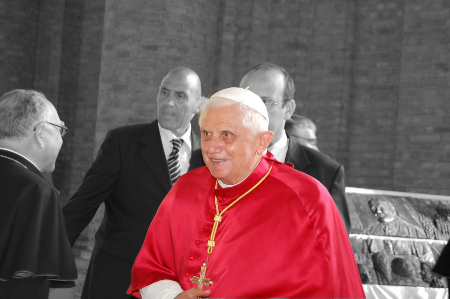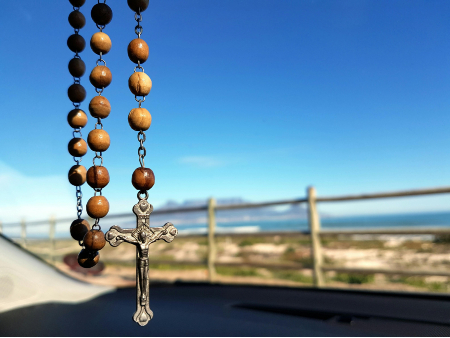We ask you, humbly: don't scroll away.
Hi readers, it seems you use Catholic Online a lot; that's great! It's a little awkward to ask, but we need your help. If you have already donated, we sincerely thank you. We're not salespeople, but we depend on donations averaging $14.76 and fewer than 1% of readers give. If you donate just $5.00, the price of your coffee, Catholic Online School could keep thriving. Thank you.Help Now >
The Robber Council of Hyannis Port
FREE Catholic Classes
"It was the consensus at the Hyannisport conclave that Catholic politicians 'might tolerate legislation that would permit abortion under certain circumstances if political efforts to repress this moral error led to greater perils to social peace and order,'" writes Hendershott quoting Jonsen. Eventually, this doctrine was popularized to the "I'm personally opposed but . . . ." pabulum that sits easy on the lips of compromised politicians.
Highlights
Catholic Online (https://www.catholic.org)
2/11/2013 (1 decade ago)
Published in Politics & Policy
Keywords: abortion, dissent, Andrew M. Greenwell
CORPUS CHRISTI, TX (Catholic Online) - According to exit polls taken during the 2012 Presidential election, approximately 50% of Catholics in the United States voted to re-elect Obama, who is, without question, one of the most pro-abortion Presidents in the history of the United States.
Additionally, a large proportion of Catholic voters are members of, or identify with, the Democratic Party, whose platform "strongly and unequivocally supports Roe v. Wade and a woman's right to . . . a safe and legal abortion, regardless of ability to pay," and "oppose[s] any and all efforts to weaken or undermine that right."
The disconcertingly high percentage of "pro-choice" voters who continue to identify themselves as "Catholic," are assuaged, it would seem, by that common if now hackneyed dogma: "I'm personally opposed to abortion, but . . ." It might be called, as Anne Hendershott named it in her excellent article in the Wall Street Journal, the "Kennedy dogma."
The "Kennedy dogma" is, of course, not a dogma of the Church. It is an anti-dogma if it is anything. It is the bastard child of dissenting priests and some rich Catholic laity who ought to have been worrying about getting through the eye of a needle instead of slipping by Church teaching. The "Kennedy dogma" is traceable to what I call the "Robber Council of Hyannis Port." This latrocinium or "robber council" occurred at the Kennedy Compound in Hyannis Port, Massachusetts in 1964. It was a monstrous brainchild conceived by the unsightly and miscegenous coupling of the Jesuits on the one hand and the Kennedy and the Shriver families on the other.
Pope Paul VI famously observed that the "smoke of Satan" had entered into the Church from "some fissure." Well the "smoke of Satan," redolent of the "spirit" of the angel of death, entered into Democratic politics as a result of the Robber Council of Hyannis Port. Like most smoke from the netherworld, it has left its indelible, sulfuric odor. It is a spirit from which the Democratic Party--and the Catholics who identify with it--will have to be exorcised, and perhaps only after prayer and fasting.
There are several sources which describe what went on in the Robber Council of Hyannis Port. One of these is the former Jesuit priest and emeritus professor of ethics at the University of Washington, Albert R. Jonsen. He mentions the Robber Council of Hyannis Port (though certainly not by that name) in his 2003 book The Birth of Bioethics.
We ask you, humbly: don't scroll away.
Hi readers, it seems you use Catholic Online a lot; that's great! It's a little awkward to ask, but we need your help. If you have already donated, we sincerely thank you. We're not salespeople, but we depend on donations averaging $14.76 and fewer than 1% of readers give. If you donate just $5.00, the price of your coffee, Catholic Online School could keep thriving. Thank you.Help Now >
As Jonsen tells the story, a group of dissident priests--most of them compromised Jesuits who held erroneous notions of conscience and were proportionalists--gathered together at the behest of the Kennedy and Shriver families at the Kennedy Compound in Hyannis Port to brainstorm how they might enable the politically-hungry and Machiavellian Kennedy family sidestep what was seen as the politically embarrassing teachings of the Catholic Church on contraception and abortion.
The names of those who participated in the Robber Council of Hyannis Port are well known. The list of names of those participating is a list of theological dissenters, they are known purveyors of moral diaphonia. They are sophisticated merchants of moral rationalization whose dubious skill (I shan't call it a charism) lies in making a non serviam sound like a fiat mihi.
They were birds of a feather, or--perhaps better--snakes of a scale. We recognize them as theologians whose names have been rubbed off the diptychs that bear the names of faithful or trustworthy Catholic moral theologians.
There was the German Fr. Joseph Fuchs, S.J., a professor at the Pontifical Gregorian University, and between 1963 to 1966 a prestigious member of the Pontifical Commission on Population, Family, and Birth, and chair of the Commission's majority report which was rejected by Pope Paul VI in his encyclical Humanae vitae. At one time orthodox, this theologian after an intellectual "conversion" of a rather questionable kind took a turn toward the dark side, ultimately rejecting the Church's traditional teaching regarding the natural moral law and any notion of moral absolutes.
There was the left-leaning Fr. Robert Drinan, S.J., then acting as dean of Boston College Law School, whose moral sophistry allowed him to hatch the schizophrenic notion hatched of legal positivism that, while abortion was "virtual infanticide," its legality was an entirely separate issue from morality. There is perhaps no greater condemnation of Fr. Drinan that that of the late Cardinal John O'Connor who publicly chastised Drinan in the archdiocesan paper Catholic New York in June 20, 1996: "You could have raised your voice for life, you raised it for death. Hardly the role of a lawyer. Surely not the role of a priest."
There was then-Jesuit J. Giles Milhaven, S.J., who soon thereafter left the priesthood and religious life (like he had earlier left Catholic morality) to marry in 1970. Milhaven was a notorious signator of the "Catholic [sic] Statement on Pluralism and Abortion," the New York Times ad of October 7, 1984, sponsored by that inaptly-named Catholics for a Free Choice. That ad and his signature may be Exhibit 1 at his final judgment.
There was Fr. Richard McCormick, S.J., the proportionalist moral theologian and good friend of fellow dissenters Rev. Richard McBrien and Rev. Charles Curran, whose theories were implicitly lambasted by Blessed John Paul II's encyclical Veritatis Splendor, though, like a little boy who blamed anyone but himself, he never seemed able to admit it.
There was the famed dissenter and collarless priest Charles Curran, the only non-Jesuit in the group, and professor at Catholic University of America who is now at theologically milquetoast Southern Methodist University, after Cardinal Ratzinger while Prefect of the Congregation of the Doctrine of the Faith in 1986 found not suitable or eligible to teach as a Catholic theologian.
"It was the consensus at the Hyannisport conclave that Catholic politicians 'might tolerate legislation that would permit abortion under certain circumstances if political efforts to repress this moral error led to greater perils to social peace and order,'" writes Hendershott quoting Jonsen. Eventually, this dogma was popularized to the "I'm personally opposed but . . . ." pabulum so prevalent today on the lips of compromised politicians.
According to Milhaven's recollection: "The theologians worked for a day and a half among ourselves at a nearby hotel. In the evening we answered questions from the Kennedys and the Shrivers. Though the theologians disagreed on many a point, they all concurred on certain basics . . . and that was that a Catholic politician could in good conscience vote in favor of abortion."
Where was a Pascal when we needed him? In his Fourteenth Provincial Letter, Pascal took to task some of the Jesuits in his day (the 17th century) for what he took to be their lax teachings regarding homicide. He called their rationalizing the "pursuit of that phantom which, airy and unsubstantial as it is, you hold to be a legitimate apology for murder."
The "Kennedy dogma" devised by these dissenters is, if anything is, a "phantom" teaching, "airy and unsubstantial," and nothing less than a "legitimate"--or perhaps better illegitimate--"apology for murder." It was the voice of Moloch, not the Holy Spirit.
Pascal took it unto himself "to show . . . how far" the Jesuits had "departed from the sentiments of the Church and even of nature itself." "The permissions of murder," Pascal says as he chastises the lax sons of St. Ignatius of Loyola, "render it very apparent, that you have so far forgotten the law of God, and quenched the light of nature, as to require to be remanded to the simplest principles of religion and of common sense."
"What can be a plainer dictate of nature," Pascal asks rhetorically invoking St. John Chrysostom and which we could equally ask of the scandalous "Robber Council" of Hyannis Port, "that 'no private individual has a right to take away the life of another'?"
Would that a Pascal had been among these dissenters at Hyannis Port, a Catholic who may have had the prophetic backbone to have asked them point blank: "To come to the point, with you, fathers, whom do you wish to be taken for?--for the children of the Gospel, or for the enemies of the Gospel? You must be ranged either on the one side or on the other; for there is no medium here."
To the Kennedy and Shriver clans who, as Catholics wanted nevertheless to appear politically reasonable before the world, Pascal would have trumpeted this Jeremiad: " Woe unto you when men shall speak well of you! and the devil says: Woe unto those of whom the world does not speak with esteem!"
Here is the Pascalian ultimatum that the dissenting Jesuits numbered among the members of the "Robber Council" failed to heed: "Judge, then, fathers, to which of these kingdoms you belong. You have heard the language of the city of peace, the mystical Jerusalem; and you have heard the language of the city of confusion, which Scripture terms 'the spiritual Sodom.' Which of these two languages do you understand? which of them do you speak?"
Pascal would have issued his evangelical call to repentance: "Your murderous decisions being thus universally detested, it is highly advisable that you should now change your sentiments, if not from religious principle, at least from motives of policy. Prevent, fathers, by a spontaneous condemnation of these inhuman dogmas, the melancholy consequences which may result from them, and for which you will be responsible."
But alas, the spirit of Pascal--like the spirit of St. Ignatius of Loyola--was not among the compromised Jesuits that day to clear out Satan's smoke, and so the jesuitical temporizers won the day at the "Robber Council" of Hyannis Port. Corruptio optimi pessima.
Though Pascal and St. Ignatius were absent, God himself was, however, there, as he is anytime there is a decision over life and death. And He asked the question of them--whether they heard it or squelched it so that they would not hear it we shall not know, but God knows: "Consider that I have set before you this day life and good, and other the other hand death and evil." (Deut. 30:15)
At best, what happened at this "robber council" was a failure of nerve, a rejection of the Gospel, an act of moral cowardice that led Frs. Jonsen, Fuchs, Drinan, Millhaven, McCormick, and Curran to compromise the Gospel of Life that day at Hyannis Port. At worst, it was an express and intentional and knowing rejection of the Gospel of Life.
Like Esau, they either foolishly or intentionally exchanged their inheritance for a mess of pottage. (Gen. 25:29-34) Either way, not a pretty sight.
Let them drink that mess or pottage to its dregs, and live with the moral heartburn of their decision and confront the Lord of Life with it on their conscience as a blot.
As for me and my house, I chose life for many reasons, but perhaps foremost for the seemingly paradoxical reason that I no longer want to live I, but rather would have Christ live in me. (Gal. 2:20) And I know that if I do not chose life for the little ones, then I have also forsaken Christ, for whatever we have done or allowed to be done to the least of our brothers, we have done or allowed to be done to Christ. (cf. Matt. 25:40)
-----
Andrew M. Greenwell is an attorney licensed to practice law in Texas, practicing in Corpus Christi, Texas. He is married with three children. He maintains a blog entirely devoted to the natural law called Lex Christianorum. You can contact Andrew at agreenwell@harris-greenwell.com.
---
'Help Give every Student and Teacher FREE resources for a world-class Moral Catholic Education'
Copyright 2021 - Distributed by Catholic Online
 Hi readers, it seems you use Catholic Online a lot; that's great! It's a little awkward to ask, but we need your help. If you have already donated, we sincerely thank you. We're not salespeople, but we depend on donations averaging $14.76 and fewer than 1% of readers give. If you donate just $5.00, the price of your coffee, Catholic Online School could keep thriving. Thank you. Help Now >
Hi readers, it seems you use Catholic Online a lot; that's great! It's a little awkward to ask, but we need your help. If you have already donated, we sincerely thank you. We're not salespeople, but we depend on donations averaging $14.76 and fewer than 1% of readers give. If you donate just $5.00, the price of your coffee, Catholic Online School could keep thriving. Thank you. Help Now >











 Daily Readings for Wednesday, April 17, 2024
Daily Readings for Wednesday, April 17, 2024 St. Anicetus: Saint of the Day for Wednesday, April 17, 2024
St. Anicetus: Saint of the Day for Wednesday, April 17, 2024 Prayer to Love God above all Things: Prayer of the Day for Wednesday, April 17, 2024
Prayer to Love God above all Things: Prayer of the Day for Wednesday, April 17, 2024


